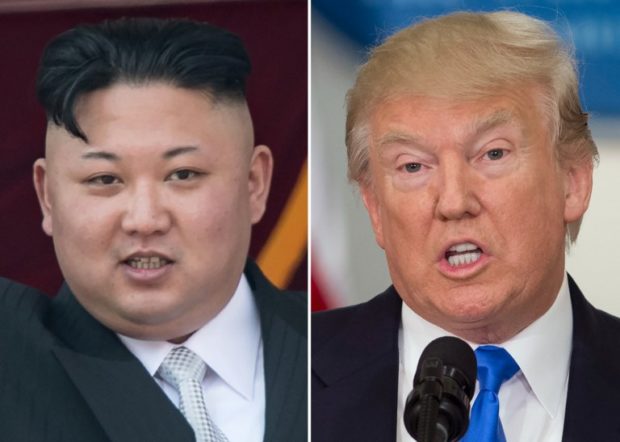Trump-Kim talks spark hope of nuclear detente

This combo of file photos shows an image (L) taken on April 15, 2017 of
North Korean leader Kim Jong-Un on a balcony of the Grand People’s Study House following a military parade in Pyongyang; and an image (R) taken on July 19, 2017 of US President Donald Trump speaking during the first meeting of the Presidential Advisory Commission on Election Integrity in Washington, DC. AFP FILE
PARIS – World powers Friday hailed the announcement of unprecedented talks between a US president and a North Korean leader, saying it offered a “glimmer of hope” of denuclearization on the Korean peninsula.
The move is a high-stakes encounter for both US President Donald Trump and North Korea’s Kim Jong Un, who have traded insults in the past and threatened to wipe out each other out.
South Korean National Security Advisor Chung Eui-yong said the historic meeting would take place by the end of May.
Here is some of the global reaction:
South Korea
Article continues after this advertisementPresident Moon Jae-in said the news was “like a miracle”.
Article continues after this advertisementGermany
German Chancellor Angela Merkel said “a united international stance, including sanctions, certainly offers a glimmer of hope.
“It would of course be wonderful if we could see an easing of tensions because… the nuclearization in North Korea has been a source of great concern for all of us,” she said.
Britain
“Important Kim Jong Un comes in good faith ready to fulfill obligations” under UN Security Council resolutions, Britain’s foreign minister Boris Johnson tweeted.
“We have always been clear that we want Kim Jong Un to change path and put the welfare of his people ahead of the illegal pursuit of nuclear weapons,” a Downing Street spokesman added.
“We will continue to work closely with the US, South Korea and the international community to ensure that pressure on North Korea continues and sanctions are strictly enforced until Kim Jong Un matches his words with concrete actions.”
EU
The European Union said the meeting was a “positive development” which could “create necessary conditions towards a negotiated solution.”
Russia
Foreign Minister Sergei Lavrov said it was “a step in the right direction”, stressing it was necessary to “normalize the situation around the Korean peninsula.”
IAEA
The International Atomic Energy Agency said it was hoping for “concrete progress” and added it had continued to monitor the North’s nuclear program, including through the use of satellite imagery.